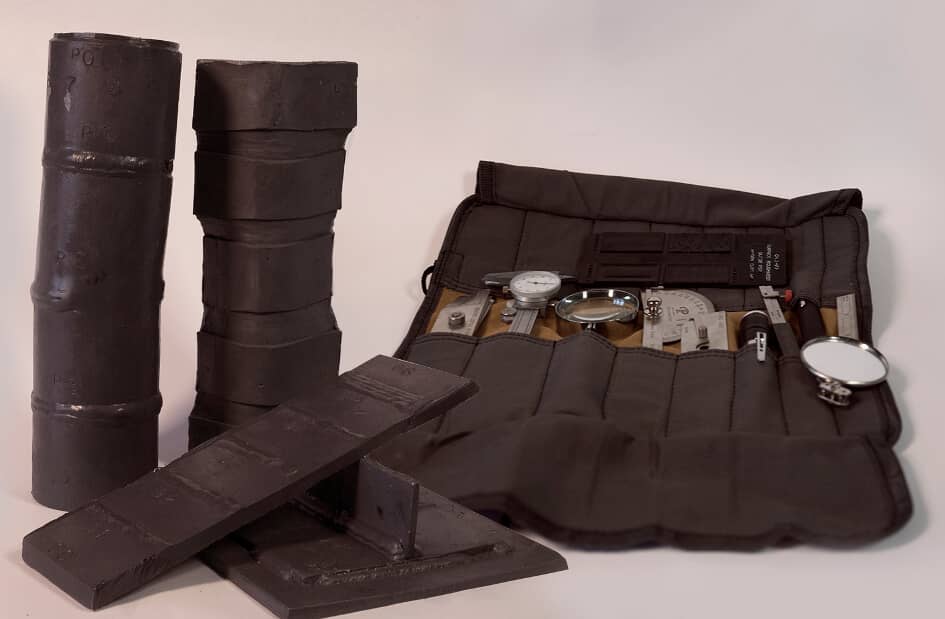What Is an AWS Certified Welding Inspector (CWI)?
An AWS Certified Welding Inspector, or CWI, is responsible for inspecting weld quality, workmanship, and conformance to specifications. Since welding is a vital aspect of building construction, vehicle manufacturing, infrastructure, and much more, CWIs help ensure the safety of the general public.
Welding is an important part of many other industries as well, including aerospace, electronics, mining, oil and gas, and shipbuilding. This provides numerous career opportunities for CWIs.
What Does a Welding Inspector Do?
CWIs don’t just look at welds. They are involved throughout the entire welding process, ensuring that it complies with project specifications and code requirements set by employers, designers, or local jurisdictions..
Good welding inspectors are involved in all stages of welding: from qualifying welders and procedures to reviewing specifications to inspection of the final weld.
Before Welding
Before welding begins, CWIs review applicable documents and may even help develop some of them too. These documents include Welding Procedure Specifications (WPS), welder qualifications, test records, project specifications, and applicable welding codes. A good CWI knows and understands the specifications and code. Then, he or she makes sure that the WPS and welder qualifications conform to those requirements.
Prior to welding, CWIs inspect both base metals and filler metals, noting that they comply with the WPS and project specifications. They will also check preheat requirements, joint fit-up, and environmental conditions, such as temperature and wind.
During Welding
During fabrication, CWIs check a variety of items to ensure that the WPS and project specifications are being correctly followed. These items include interpass temperatures, adequate fusion, cleaning, travel speed, and weld deposit size.
Inspection during welding is sometimes overlooked, but it is a critical part of ensuring weld quality. If a weld was just inspected after completion, how would the CWI know if the fit-up was correct? How would he or she know if the right filler metal strength was used or if the weld passes were cleaned? CWIs are accountable to the employer, purchaser, and users of the finished product for its quality and safety.
After Welding
After a weld is completed, a CWI will inspect it closely, checking and measuring any discontinuities such as porosity, undercut, cracks, incomplete fusion, or inadequate profile. The size of the weld is also measured for conformance to the project specifications. If any of the discontinuities do not comply with project requirements, they are considered defects and must be repaired.
CWIs use a number of tools during inspection, which will be explained in the next section.
A good CWI writes detailed reports to employers and clients to describe the quality of the welds and any defects or repairs that need to be made.
How Does a Welding Inspector Inspect Welds?

Welding inspectors use a number of measuring tools to check weld quality. They use tools like rulers, magnifying glasses, flashlights, and numerous gauges to measure size, undercut, reinforcement, and other discontinuities of a weld to make sure they are within the acceptable range.
* The tools in the image above are from our online CWI training course and are the same tools used for the CWI exam.
How to Become a CWI
A CWI is certified by the American Welding Society (AWS) through a rigorous six-hour three-part certification exam. Test takers must score 72% or more on all three parts to earn the CWI certification.
Also, AWS requires an eye exam and a combination of education and work experience. For more detailed information about becoming a CWI, go to our page about the process.
How Much Does a CWI Make in a Year?
According to PayScale, an average welder can expect to earn $30,000 to $40,000 a year. A CWI can command an average of $60,000 per year or more.
Welders are able to increase their earning potential by learning the inspection trade and becoming a CWI.
That said, it is not uncommon for experienced welders to earn more than newly certified CWIs. It all depends on the project and the skill required. But when it comes to maximizing your wages, it does not hurt to get certified in welding inspection. You will only increase your opportunities for better jobs and higher salaries.
What Makes a Good CWI?
CWIs have good job opportunities and high pay because they must be knowledgeable about every part of the welding process in order to inspect weld quality and take responsibility for each project.
But knowledge alone is not enough.
An effective CWI is also an effective communicator. He or she must be able to clearly understand each person’s role in the project and accurately report the status and quality of the project to stakeholders.
Also, CWIs must be able to give feedback to welders so they can correct their welds when necessary.
CWIs must have thick skin and the ability to speak openly with stakeholders, even when they have to communicate something they don’t want to hear. If a CWI lies about defects because he or she wants to please the employer, the safety of the general public is put at stake.
The CWI: A Vital Role in the Construction Industry
As you can see, CWIs are essential to building projects of all types. Welding inspectors provide quality assurance by monitoring the whole welding process. They use a variety of tools to inspect welds. They are tested for certification by AWS to ensure skill and knowledge and they are rewarded with higher salaries for their work.
If you would like to learn more about welding inspection, read our articles on important topics about the industry including the CWI exam and how to become a CWI.